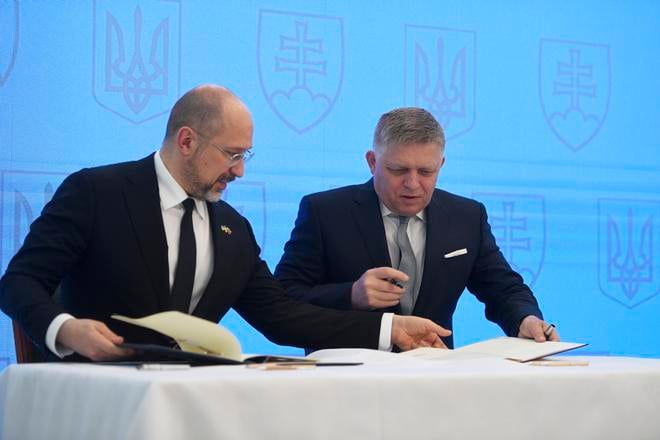Welcome to your weekly commentary and overview of news from Slovakia. The Michalovce roadmap sees Fico cheer for Ukraine. The European Commission asks hard questions about the Special Prosecutor’s Office. And what does “our Hungarians” even mean in Slovakia?
If you have a suggestion on how to make this overview better, let me know at michaela.terenzani@spectator.sk.
Fico goes ‘pro-Ukraine’
“Ukraine-sceptic” and “pro-Russian PM’s proxy” is how Western media outlets described Peter Pellegrini’s victory in the presidential election last week, fully expecting Slovakia to drift further from the West.
Yet just five days after Pellegrini’s election to the top constitutional post, the Fico government produced an unexpected turn in Slovak-Ukrainian relations.
On Thursday, the cabinet travelled to Michalovce, a town in eastern Slovakia not far from the border with Ukraine, for a long-planned joint session with a Ukrainian government delegation led by Prime Minister Denys Shmyhal. It wasn’t the first time the two prime ministers have met since Fico became Slovakia’s prime minister again last year – their first meeting took place in the border city of Uzhhorod in January this year.
What the Michalovce roadmap says
Shmyhal and his foreign affairs minister, Dmytro Kuleba, were both in attendance and both also held separate meetings with their respective Slovak counterparts, Fico and Juraj Blanár, who both like to stress that their foreign policy is, above all, “Slovak” and “sovereign”.
By the end of the day, Fico and Shmyhal had inked a document, which they called a “roadmap”, outlining the relationship between Slovakia and Ukraine going forward. You might wonder if this still the same old Robert Fico after reading this document, which includes:
the stated objective as being to strengthen relations between Ukraine and Slovakia on the basis of, among other things, the territorial integrity and sovereignty of Ukraine within its internationally recognised borders of 1991;
respect for the right of Ukraine to freely choose its own future, including to be a fully-fledged part of the European and Euro-Atlantic communities;
the need to continue implementing the policy of non-recognition of the Russian Federation's attempt to annex the Crimea and parts of Ukraine’s Donetsk, Kherson, Luhansk and Zaporizhzhia regions;
Slovakia's condemnation of the illegal, unjustified and unprovoked war of aggression against Ukraine;
Slovakia’s readiness to support the Peace Formula of President Volodymyr Zelensky, including at the upcoming Global Peace Summit in Switzerland.
All this is in stark contrast to what Fico has said about Ukraine in the very recent past: namely, that it is unrealistic to expect the Russians to leave Crimea or Donetsk, that Russia was provoked into starting the war by “Ukrainian neo-Nazis”, that Ukraine’s NATO accession would be a “big mistake”, that Ukraine “isn’t a sovereign country”, or that Zelensky’s peace plan is unrealistic.



 Denys Shmyhal and Robert Fico signing the Michalovce roadmap. (source: TASR)
Denys Shmyhal and Robert Fico signing the Michalovce roadmap. (source: TASR)